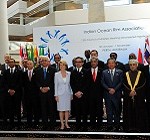As Prime Minister Manmohan Singh commented earlier this year, India now sees itself as a “net security provider” to the region. This reflects India’s aspirations to take a leading strategic role throughout the Indian Ocean and to expand its strategic reach even into the Pacific.
It is natural to expect that India’s area of strategic interest will grow as its economic and political influence expands. This means that in coming years India will have a growing interest in encouraging regional stability, including in containing problems that emanate from the many failed or fragile states in our region.
Many countries see India in benign terms and welcome its rise as a regional security provider. There is a growing expectation that India will shoulder more of the responsibilities of providing the so-called “public goods” of security. The Indian Navy is already an important provider of security throughout much of the western Indian Ocean to combat threats coming from the failed state of Somalia.
But what does all this mean in terms of India’s defence capabilities and its regional relationships? Over the last decade or more India has spent a lot of money on modernising its defence forces. This includes buying aircraft carriers, submarines and long-range aircraft that give it the ability to respond to security problems throughout much of the Indian Ocean region.
But India’s regional security relationships are relatively less developed. India gives more attention to regional security relationships than it did a decade or two ago, but the depth of many of these relationships still lags well behind India’s relative “hard power” military capabilities.
Indeed, India’s greatest strategic challenge in the Indian Ocean in coming years may not be the development of power projection capabilities such as aircraft carriers but the quality of the strategic relationships that it can build in the region. In many ways, the extent to which India will be recognised as a regional leader will depend on these relationships.
India now has good security relations with some smaller states in the Indian Ocean, but India’s partnerships with the middle powers of the region need much more attention. These include with Indonesia, Malaysia, South Africa and Australia. All these countries exercise considerable military power within their own sub-regions and have considerable political and economic influence throughout the Indian Ocean and beyond on the international stage. India will need to work with countries such as these if it is to extend its strategic influence throughout the region.
One key reason why these relationships have been relatively slow to develop is the general caution among Indian policy-makers against security and defence cooperation with other countries. Some see such cooperation as inconsistent with India’s long term objective of strategic autonomy. They fear that security partnerships – and even with lesser powers – may undermine India’s destiny to become a great power.
India is of course not alone in its caution about security and defence cooperation with other countries. Before the U.S. became a global power it also sought to avoid what it called “foreign entanglements.” But while – in an earlier age – the United States could dominate its own hemisphere without the need for local partnerships, that option is unlikely to be available to India in the Indian Ocean region. The provision of security on a unilateral basis is becoming untenable even for the United States. Security cooperation is now understood to be a way of expanding strategic influence, not restricting it.
India may now be among the largest military powers in the Indian Ocean but it will still need to work closely with others if it is to take a leading role in the region. Others will increasingly expect India to demonstrate leadership in a cooperative manner. India’s slowness in developing closer security relationships with other key countries of the Indian Ocean will only slow down its reach for regional leadership.
David Brewster is Senior Visiting Fellow, Maritime Studies Programme, Gateway House: Indian Council on Global Relations.
This article was exclusively written for Gateway House: Indian Council on Global Relations. You can read more exclusive content here.
For interview requests with the author, or for permission to republish, please contact outreach@gatewayhouse.in.
© Copyright 2013 Gateway House: Indian Council on Global Relations. All rights reserved. Any unauthorized copying or reproduction is strictly prohibited.


